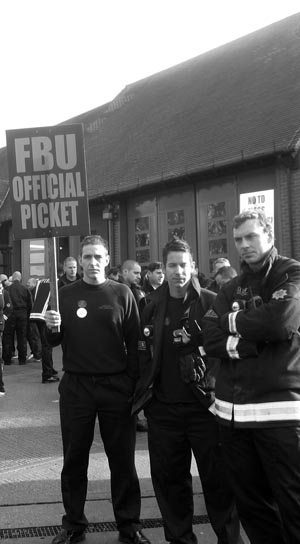Which way for the FBU?
WORKERS, DEC 2010 ISSUE
After two strike days and a march, the London Fire Brigades Union suspended its planned strike days on 5 and 6 November, Bonfire Night weekend, as a tactical move to get talks re-opened. This sensibly reflected their recognition of the widespread dissatisfaction from the general public at such a strike, threatened at the busiest time of the year, and the subsequent falling away of popular support.

|
|
FBU members picket South Woodford Fire station during their strike in October. Photo: Workers |
The London FBU has to avoid operating only a one-size-fits-all tactic to address every strategic situation: strike, strike, strike.
The political leadership of the employer, London Fire and Emergency Planning Authority, is driven by the Mayor of London’s office and had set giant elephant traps for the FBU. The employer had clearly analysed the balance of forces: two out of every five firefighters in London are not union members – an unheard of situation knowing the history of the FBU; the employers had created and the FBU had allowed AssetCo, which had originally only done fire tender maintenance, to build up a scab strikebreaking force nearly 1,000 strong; the employer had moved 28 fire tenders away from the stations as a secret reserve in South London; nearly 1,000 of the FBU’s members voted against the strike.
A propaganda softening-up war focused on the significant number of firefighters who have second jobs. For the FBU to introduce into its negotiating position that any shift changes should not impact on second jobs rather undermined the argument that the second jobs were because wage rates were so low. If wages are too low to live on, that needs to be addressed on its own. The threat of mass dismissals and re-engagement on the new changed shift patterns has now been withdrawn as negotiations and arbitration are entered into.
But the bullish government threat is now that if the fire service could do without 28 tenders withdrawn and hidden away as a scab reserve without the FBU objecting, then they could do without them permanently. Another elephant trap provocation is revealed, plus the associated job losses to go with the missing tenders.
The FBU will want to get control of the negotiating agenda around shift patterns, and to control the “modernisation agenda”. It was by doing this that Unison London Ambulance Service members defeated similar moves over 15 years ago and are now some of the most highly skilled and paid ambulance staff in Britain.
Being seen to prioritise public safety will be crucial to the FBU’s case. The employer is setting the agenda at present. FBU members might consider the merit of a guerrilla approach (see Marxist Thinking on menu). The FBU membership need to retake control of their union.